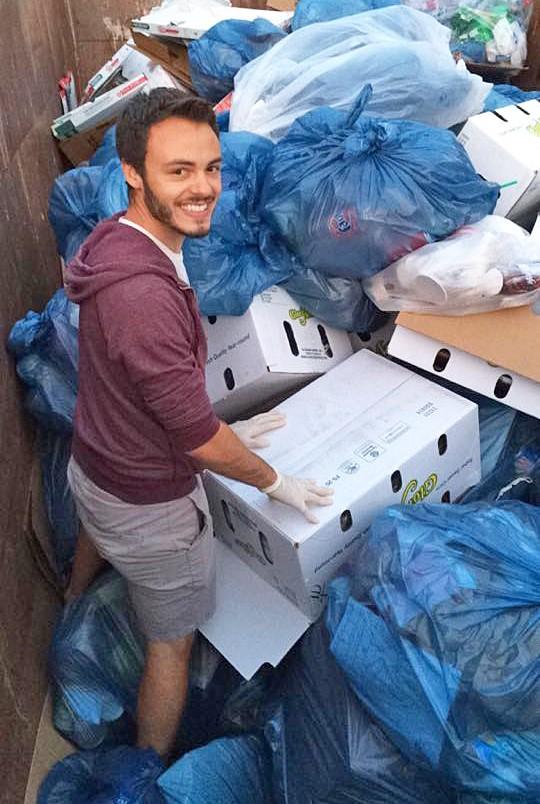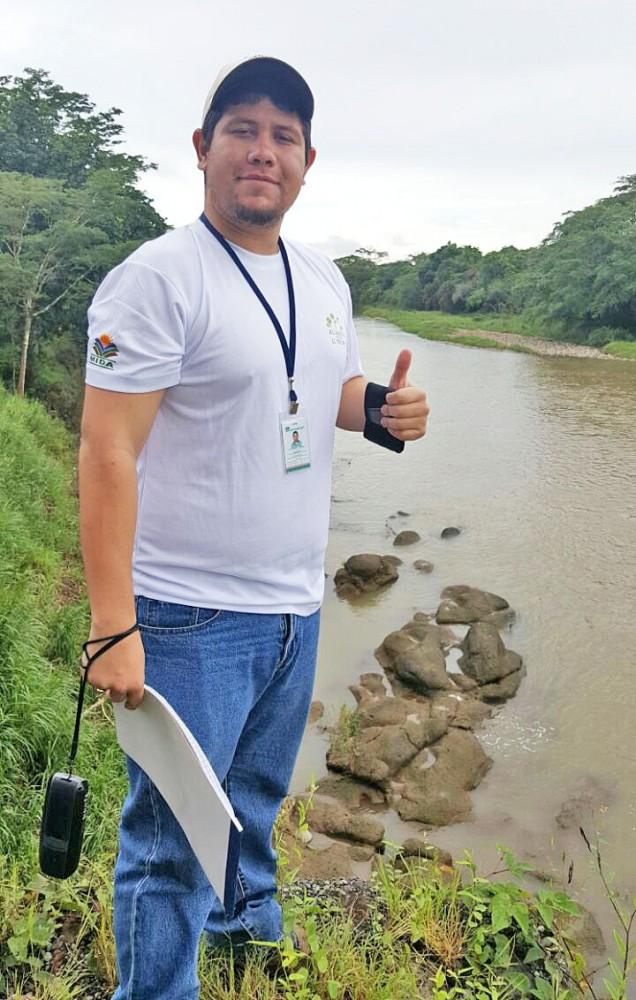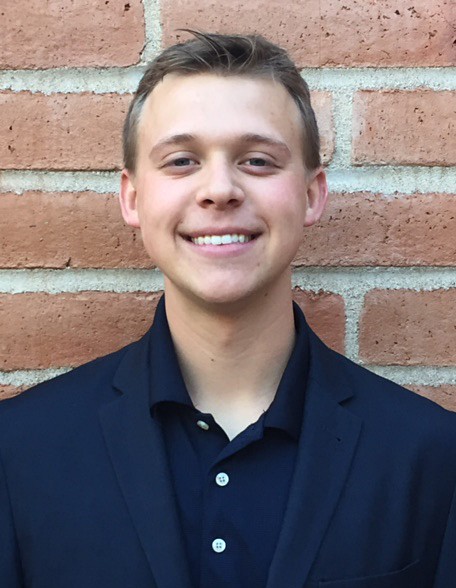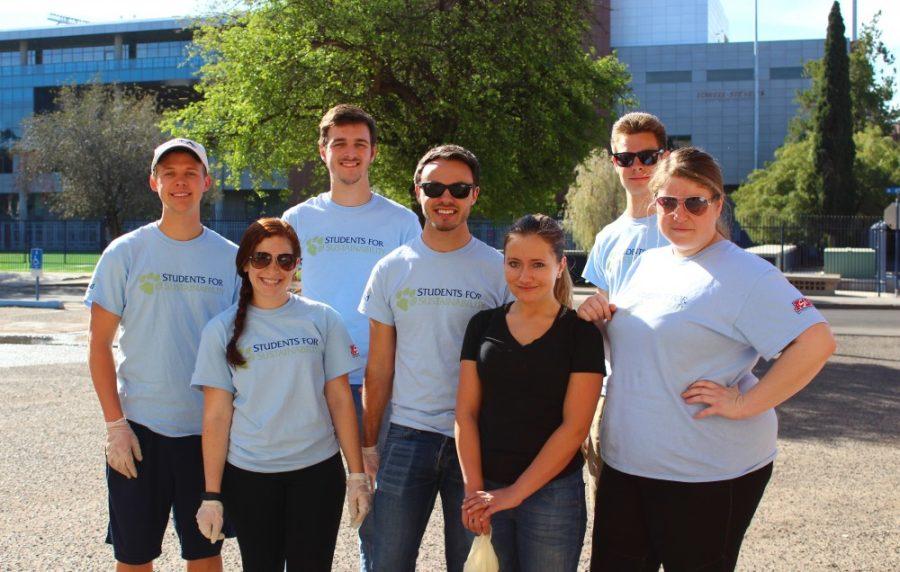Trevor Ledbetter
On an average day, Trevor Ledbetter will meet with different departments at the University of Arizona and discuss how each can make itself more sustainable and how they might work together to be more responsible as a whole.
Intrigued and concerned by a changing environment, Ledbetter came to the UA to study environmental science, one of the UA’s leading fields of study. Later adding ecology and evolutionary biology as a secondary degree, as well as a minor in marine science, Ledbetter graduated in the spring of 2017.
RELATED: UA community collaborates on growing sustainable campus
Ledbetter is now the Sustainability Program Manager for the UA Office of Business Affairs.
“Because the position is new to Business Affairs and because I am just getting started, the breadth of the position is still fairly undefined and open to whatever needs I am able to identify within the various units that fall under Business Affairs,” Ledbetter said. “[That] includes everything from Facilities Management and Planning, Design and Construction to Arizona Public Media and Human Resources.”
Currently, Ledbetter is meeting with the heads of each of those departments in an attempt to centralize sustainability efforts across the different organizations.
“For me, sustainability is about our future,” Ledbetter said. “We are surrounded by a world that is already seeing the effects of climate change, ocean acidification, habitat destruction, etcetera, and it is up to our generation to take the steps necessary to slow and reverse these trends of increasing destruction, if not for our planet, to preserve our own societies.”

It was during his junior year that Ledbetter decided to take action in the fight for sustainability.
“My junior year of college, I started to become involved with Students for Sustainability, an ASUA student program, starting out in its marketing committee, working to advertise many of the events that the organization puts on, as well as educate students in how to be more sustainable in their own lives,” Ledbetter said. “My senior year, I became the marketing chair and organized the Wildcat Waste Challenge to help educate students and address waste and recycling issues in the main library.”
Now as Sustainability Program Manager for the Business Affairs Office, Ledbetter is continuing his efforts to create a more sustainable UA.
“Moving forward, I am very excited to start actively working with many of the units that fall under Business Affairs, as well as other organizations on campus like ASUA Students for Sustainability and the Office of Sustainability,” Ledbetter said. “[I want] to begin actively engaging with the many challenges and barriers to increased sustainability efforts on our campus.”
Ledbetter had some advice for students who want to be a part of the movement toward sustainability.
“Do your research and don’t be afraid to reach out to those with knowledge in that field,” Ledbetter said. “Sustainability can be difficult, especially when on its face it competes with an economic bottom line. However, sustainability often offers more benefits to an organization’s bottom line, sometimes in energy savings and, in other instances, in how an organization is viewed by consumers or investors.”
Ledbetter said he hopes that in the future human civilization will implement a healthy, but drastic systematic change.
“Sustainability in higher education and at institutions like the UA should be institutional,” Ledbetter said. “Every contract, every course, every purchase, every activity should consider the environmental impacts of their respective reaches without the need for sustainability officers.”
RELATED: UA’s Sustainability efforts hampered by decentralization
Victor Gomez
On an average day, Victor Gomez is collecting and interpreting data from one of Panama’s many water systems. Where and for what reasons are more complicated questions.
But according to Gomez, it all comes down to finding a balance between a developing society and depleting resources.
Born on the west coast of Panama in a province called Chiriquí, Gomez grew up with the ideal of sustainability, seeing the balance of nature and society shift. He graduated from the UA in May of 2014 with a degree in hydrology and water resources.
Now Gomez works for the Ministry of Environment of Panama as a hydrologist and water resource manager.
“Panama is growing too fast, and many projects are taking place in the country, thus sustainability is the key to keep the country’s essence and its natural resources,” Gomez said. “The Ministry of Environment is the national entity that governs, protects, manages, preserves and restores natural resources in Panama.”
Water is a precious resource all over the world, but Panama takes it a step further. Thousands of ships use the Panama Canal annually to get from one ocean to the next. Panama also has a huge water need for agriculture, power and more.
Currently, Gomez is collecting data from 12 of the country’s watersheds, or sections of water flow, that are located in high-demand areas to calculate an actual amount of available water in each.
Additionally, Gomez said he is working to establish a network of hydrological and meteorological stations to collect data that might provide a better understanding of the behavior of local river flow.
“Also, we are determining a methodology to establish environmental flow in all rivers in the country,” Gomez said. “Environmental flow can be defined as the amount of water with enough quality and in the right time that a river needs to assure its ecological needs and purposes.”
While Gomez said that he’s always held the ideal of sustainability, it was the UA that gave him the tools to make progress.

“My time in the United States and specially at the University of Arizona made me realize that development and natural resources can go together, hand by hand, with the same relevance,” Gomez said. “The knowledge acquired at the Department of Hydrology and Atmospheric Sciences is what inspires me to make things right, since the key for a sustainable world, I think, is a matter of education and getting involved.”
Gomez hopes more people will get on the same page when it comes to sustainability.
“My goal is to get all the parts of the process involved and aware of the importance of sustainability,” Gomez said. “One of the biggest mistakes is that developing countries work in sustainability in an isolated way.”
Gomez said the best way to break from that trend is to unify our efforts.
“To achieve this goal, we need to integrate all the parts in the process: politicians, lawmakers, state governments, local governments, NGOs, universities, the private sector and all the different users of the natural resources of Panama together,” Gomez said.
If you want to see a future with a healthy balance of society and nature, you should take action, Gomez said.
“Even the smallest effort is valuable,” Gomez said. “It should start from somewhere, but it should start now.”
RELATED: Yoga, stress relief come to UA Community Garden
Cole Pihl
On an average day, Cole Pihl will travel to one of Arizona’s 1,500 water systems to inspect the quality of the water and the sustainability of the structure.
“It’s a weird job,” Pihl said. “When I say weird, I mean that sometimes when I go on inspections and I have to meet with public systems, I have to technically read them their rights because I’m part of the state.”
Pihl graduated from the UA in May of 2017 with a degree in environmental sciences. He now works as an environmental scientist for the Arizona Department of Environmental Quality.
“It gets kinda sketchy when you say that you have a right to a lawyer, but usually it’s pretty straightforward,” Pihl said. “It’s definitely interesting, and I get to see a lot of cool parts of the state, deal with a lot of problem solving and things like that. It’s a great job.”
While Pihl is using his knowledge of environmental science to ensure sustainable water practices across the state, it wasn’t too long ago he didn’t have a clue about sustainability.
“I knew nothing [about] sustainability when I first came to the U of A,” Pihl said. “The program that I found was Students for Sustainability.”

In his time with SFS, Pihl started out working in the waste reduction committee his freshman year and was co-director by the time he was a senior.
“One thing that I took from it that I didn’t really know as much about is not just environmental health but also the social justice side of things and how those things piece together,” Pihl said.
He said he hopes in the future he will be able to get involved with environmental policy-making to add his scientific background to a process dominated by politics and business.
“As we deal with more and more challenges related to climate change, a transition to a cleaner energy grid is probably one of the biggest things that we can strive for,” Pihl said. “I’m really focused on that; it’s something I’m hoping to see in the next few decades, for sure.”
Pihl said it’s important to be optimistic when facing issues like climate change and a damaged environment, otherwise nothing will get done.
“When you get involved with sustainable initiatives, you’re going to get a lot of pushback from other entities,” Pihl said. “Be patient. A lot of things take a long time to get started in the first place.”
Follow Chandler Donald on Twitter









